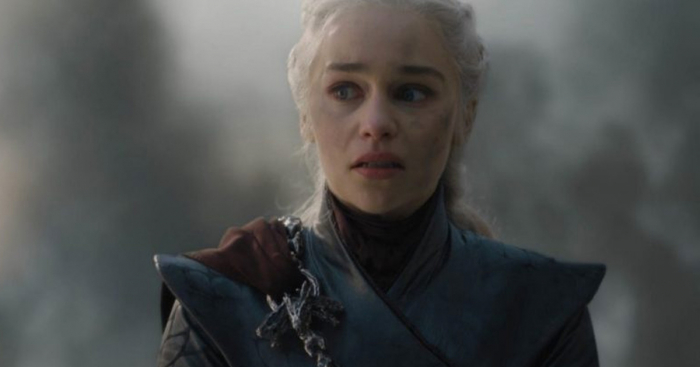On the surface, it is the resolution to the question that was asked in the first episode – who should rule the Seven Kingdoms? – but in reality, it is something altogether more troubling. It is an episode that says far more about our world than the world of Westeros; about the need for closure, for endings, for "other creative opportunities and the possibility of making the transition to movies". It is a full stop planted before its emotional or creative time.
The episode opens in the ashes of King’s Landing, the falling snow mingling with the fiery remnants of the city that stood. Tyrion, Jon and Arya walk through the wreckage, past the torched bodies of children, before Daenerys stands in front of her forces and declares the war, the conquest, far from over. Peter Dinklage (whose performance as Tyrion has been one of the reliable salves in this final season) is offered his moment for the Emmy reel, as he discovers the bodies of his siblings crushed by that old enemy, falling masonry, in each other’s arms. The show’s moral compasses can stand by no longer – Tyrion throws down his natty Hand of the Queen badge and is arrested for treason. With the Dothraki and Unsullied baying for more blood (both these groups have been treated horribly by the series, something that may look even worse in years to come) and Dany seemingly willing to provide it, Jon puts a knife through her heart. All this before the second ad break.
It is a credit to Emilia Clarke – whose acting has not always escaped negativity, to be polite – that she manages to pass off the hasty transformation of her character from liberator to swivel-eyed zealot. Her final scene, in the throne room with her eventual murderer, has all the deranged self-conviction of an evangelical preacher, and, for a moment, her character’s arc felt believable. Then Jon Snow shanks her and, once again, Game of Thrones changes gear.
The second half of this final episode is devoted to the question of: "What next?" Grey Worm (who anticipated him becoming such a key player in this final season?) wants justice for his Queen, gaoling Tyrion and Jon and insisting that they pay with their lives. They don’t, predictably, with Sansa riding into town at the last moment, along with the lords and ladies of Westeros, to help free her brother/cousin. This is late Thrones at its worst: cramming disparate characters into a single, ill-defined location for the sheer audience-gratifying thrill of seeing them together. They are referred to as representing the great houses of the kingdoms, but, in reality, it’s just a chance to remind us that Robin Arryn has finally removed his mouth from his mum’s tit, that Yara Greyjoy didn’t actually die at the start of the season, and that Dorne, well, exists (though full credit to Tobias Menzies as Edmure Tully for a scene stealing reappearance, about which I have no complaints).
They choose Bran as the next king, anointing him with an ableist slur: Bran the Broken, first of his name. This has long been the bookies’ favourite conclusion to the series, though it will please few casual viewers. Bear in mind that Bran went AWOL for all of the fifth season, at least in part because his storyline was so dull and his character so unappealing. Ah well, at least Sansa reclaims the North as an independent territory where she now rules as Queen. In the final dying embers of the episode, the show cuts between the Stark children as they disappear down their ordained paths: Sansa crowned and regal, Arya off to explore beyond maps, Jon returned to the Wall and leading the Freefolk home.
Once David Benioff and DB Weiss, the show’s creators, decided that they would expedite the trajectory of Daenerys’s fall to a mere two episodes (one and a half, as it turned out), there was never going to be true satisfaction at the end of Game of Thrones. Few will have cheered when Jon knifed Dany, or when a grieving Drogon melts down the Iron Throne, as though it was ever something more than an overblown metaphor. It is an ending simply because we know that the show won’t be returning, not because of any emotional resolution. It is an oddly bloodless experience, seeing these storylines conclude (Brienne finishes Jaime’s entry in the Book of Brothers, Sam puts his fancy quillmanship to the title page of A Song of Ice and Fire, Bronn and Davos, the risen men, bicker about the treasury) knowing only that they must. Game of Thrones has to end, and so it does.
“The Iron Throne” is an episode that safely delivers the show to the graveyard of HBO’s deceased hits, to rest for eternity next to Tony Soprano, Jimmy McNulty and Carrie Bradshaw. But for fans who have devoted themselves to the preceding 72 episodes with a fervour that rivals the biggest franchises in cinema and literary history, it doesn’t deliver that crucial coup de grâce of making you feel, making you care. A few years ago, it would’ve been hard to imagine watching the final shot of Game of Thrones without the twinkle of a tear in the eye, but, tonight, that was the reality.
The Independent
More about: GameofThrones
















































